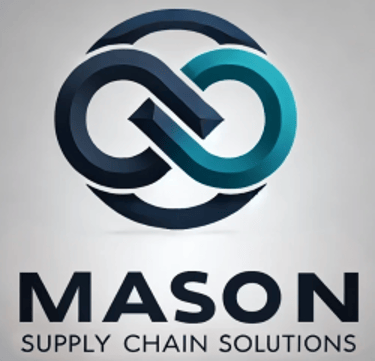MSCS WILL MAKE IT WORK, MAKE IT BETTER, MAKE IT BEST, AND NEVER LET IT REST.
Optimize Your Supply
Frequently asked questions...
What is Mason Supply Chain Solutions?
MSCS is a specialist consultancy that transforms under-performing planning environments into resilient, data-driven supply chains—without a rip-and-replace technology program. Founded and led by career supply- and demand-planning executives, we apply a four-step, ROI-focused methodology that unlocks the full value of the systems you already own:
Stabilize – Rapid diagnostic to stop the firefighting spiral, triage systemic data defects, and restore schedule adherence.
Optimize – Align master-data parameters, lot-sizing logic, and exception thresholds with strategic targets for service, cost, and cash.
Institutionalize – Embed governance workflows, dashboards, and KPI cadences so improvements persist long after the engagement ends.
Scale & Innovate – Layer advanced analytics and scenario planning to generate incremental value as organizational maturity grows.
The result is higher service, lower working capital, and planners who focus on proactive value creation instead of late-night work-arounds—all delivered through the tools you already have in place.
Has the MSCS methodology proven successful in practice?
Absolutely. Our approach has delivered measurable results across a wide spectrum of organizations—from Fortune 100 multinationals to mid-market manufacturers running their supply chains on spreadsheets. Typical outcomes include increased service level and reduced working capital, increased supply chain productivity with increased employee engagement.
Why does Mason Supply Chain Solutions’ methodology consistently deliver results?
Vendor-agnostic focus on ROI, not software sales – We are not tied to any platform provider. Our only mandate is to unlock the full value of the tools and data you already own before recommending new investments.
Practitioner DNA, executive perspective – Our team grew up in supply- and demand-planning roles, managing the 3 a.m. emergencies we now eliminate. That grassroots experience, combined with board-level accountability for service, cost, and working capital, enables solutions that resonate from the plant floor to the C-suite.
Data-driven root-cause correction – We quantify how master-data gaps, policy misalignment, and process hand-offs suppress service levels and inflate inventory. Corrective actions are prioritized by financial impact, time-boxed, and KPI-tracked to ensure they stick.
Alignment of tactical planning with strategic goals – By calibrating lot sizing, safety-stock logic, and exception thresholds to board-approved targets (OTIF, DIO, cost-to-serve), we hard-wire strategic intent into daily system behavior.
Culture shift from “heroics” to resilience – Success metrics pivot from crisis responses to preventive stability, freeing planners to focus on high-value innovation instead of perpetual firefighting.
What if our supply chain processes and tools are too outdated?
We occasionally see legacy environments where the cost of “patching” clearly outweighs the value delivered. When that’s the case, we conduct a rapid‐maturity assessment that:
Maps desired business outcomes to functional requirements – service-level targets, inventory turns, cost-to-serve, analytics cadence, etc.
Benchmarks existing processes and systems against best-in-class capabilities (e.g., exception-based MRP, predictive inventory optimization, advanced ATP).
Quantifies the performance and risk gaps – lost revenue, working-capital drag, manual-workload hours, and resiliency exposure.
Defines a technology and process roadmap – quick wins to stabilize today’s operation plus a phased investment plan (people, data, and platform) that delivers measurable ROI at each stage.
You’ll receive a concise executive report highlighting the missing capabilities, their financial impact, and vetted solution options—whether that means enhancing your current stack, adopting bolt-on analytics, or moving to a next-generation planning platform. Armed with this, you can make an informed, business-case-driven decision on modernizing your supply-chain toolkit.
I heard Rob Mason on a Podcast talking about the supply chain downward spiral and the super hero complex. What are these?
Supply-Chain Downward Spiral
When a production line stops for lack of a critical part, the entire organization pivots to expedites and firefighting. If these incidents become frequent, planners spend the bulk of their time chasing parts instead of eliminating the root causes. Corrective actions are postponed, underlying data errors persist, and risk compounds. Very quickly the business shifts from proactive optimization to perpetual crisis management, eroding service levels, inflating working capital, and exhausting talent.
Super-Hero Complex
Many cultures celebrate the colleague who “saves the day” at 3 a.m. The all-night scramble becomes a badge of honor, reinforcing reactive behavior and masking systemic weaknesses. While the hero stories sound inspiring, they institutionalize dependency on individual effort instead of robust, repeatable processes.
Our Approach
Mason Supply Chain Solutions breaks the cycle by:
Root-cause analytics – data-driven diagnostics that expose master-data gaps, policy misalignments, and process bottlenecks.
Structured corrective actions – clear owners, timelines, and KPI tracking so fixes stick.
Exception-based planning – focusing human attention on high-value anomalies while letting the system administer the routine.
Cultural reset – reframing success metrics to reward prevention over heroics, and keeping the “cape” tucked neatly away.
How can I book Rob on my show?
You can always reach out to Rob directly at robmason@masonsupplychain.com Podcast hosts can also check out Rob's podcast profile https://www.podmatch.com/member/robmason
